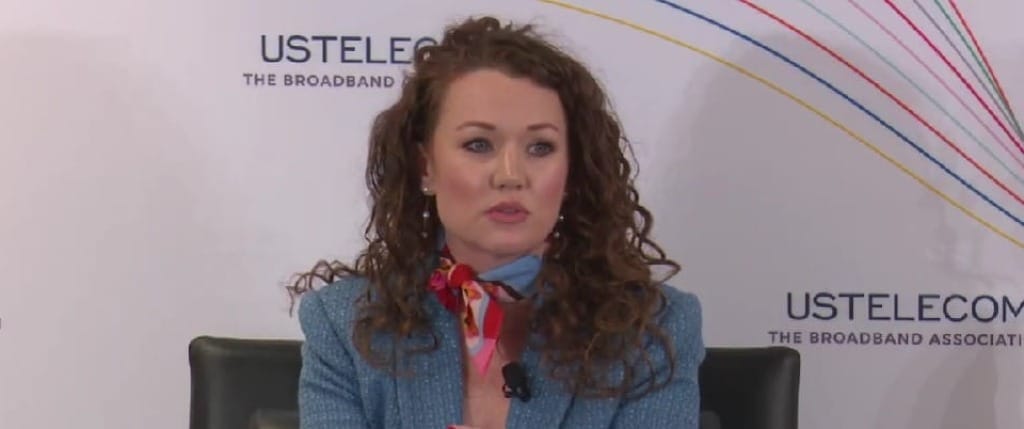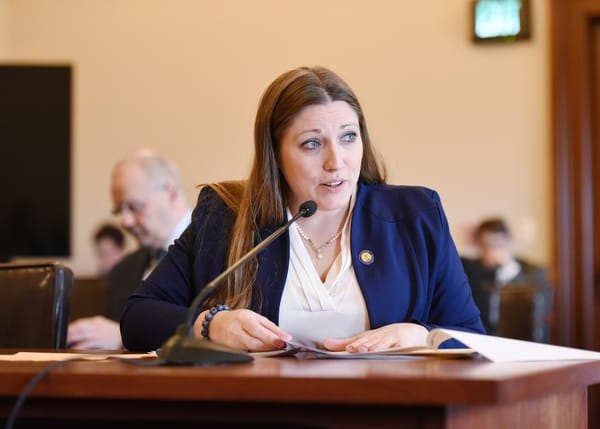Twenty-one States Push to Scrap Carrier-of-Last-Resort Laws
Telecom leaders call mandates to maintain copper a barrier to next-gen broadband.
Jericho Casper

WASHINGTON, April 11, 2025 – Industry leaders from AT&T, Lumen, Ziply Fiber and Brightspeed said Thursday that federal and state policies requiring providers to maintain copper telephone networks are diverting capital away from next-generation broadband networks.
Lumen Senior Vice President of Public Policy Melissa Mann said the company has been actively advocating for state-level reforms to laws that mandate the upkeep of copper networks. She pointed to a recent win in Utah, where lawmakers passed legislation relieving providers of certain carrier of last resort (COLR) obligations.
“We’re having positive conversations in other states as well,” Mann said, noting that at least 21 states have taken steps to modernize regulations around COLR and copper network maintenance. States like Illinois, Colorado, and Minnesota were also advancing what she described as “common-sense reforms.”
Under "carrier of last resort" mandates, incumbent providers are still legally obligated in many states to maintain and repair legacy copper networks — even in areas where most consumers have shifted to mobile, fiber, or VoIP. Many of the rules in question date back to the era of the Telecommunications Act of 1996 and earlier. Originally intended to ensure that every American had access to basic phone service, the rules have remained in place even as the market and technology have evolved dramatically.
“The more that we spend to maintain copper systems, the less we're able to spend elsewhere,” said Ziply Fiber CEO Harold Zeitz. “To me, it's less about us and profitability. It's more about our customers. We're actually… doing them a disservice, because there are failure points that just cannot be solved.”
Zeitz described the aging infrastructure in stark terms, recalling that his company sometimes resorts to buying replacement parts on eBay just to keep the copper system running. It’s an increasingly unsustainable strategy, he said.
“We have switches that are older than I am,” Zeitz added. “It's not dying because we don't want to invest. There's not equipment that I can replace this with, and the people that know how to use this are retired or gone.”
Rhonda Johnson, head of federal regulatory relations for AT&T, said the company spends $1 billion annually in California alone maintaining copper, despite 95% of customers having moved on.
“It definitely does not meet needs, whether you're in a business or in a consumer's home,” Johnson said. “It's not good for healthcare [or] education.”
Johnson said that even in disaster recovery scenarios, legacy rules often force companies to rebuild copper networks rather than deploy more modern alternatives.
“When something destroys a network — whether it’s earthquakes, mudslides, or fires — the fact that you may need to rebuild copper to provide the same services does not make sense,” she said.
USTelecom CEO Jonathan Spalter praised Federal Communications Commission Chairman Brendan Carr for his commitment to network modernization.
“Chairman Carr has been very resolute about working with us,” Spalter said. “A recent set of rules were established by the Wireline Competition Bureau that will move us forward,” Spalter said. He pointed to a waiver recently granted to Brightspeed, allowing the company to accelerate copper network retirement.
Brightspeed’s Chief Legal Officer Steve Tugentman praised three key benefits of the FCC’s updated rules on copper retirement: Providers are no longer required to maintain standalone VoIP services where other voice technologies are available; fixed wireless using 4G is increasingly being accepted as an adequate replacement; and providers are now spared from having to file repetitive notices each time they grandfather or retire copper lines.
“Only about seven to eight percent of the population still uses copper wires,” Tungan said. “Putting that much capital into investing in that small of a population – it just doesn't make sense.”
Panelists agreed that recent FCC reforms have been encouraging, but said further steps were needed. Lumen’s Mann called on the FCC to go further in recognizing wireless and even satellite as valid replacements for traditional voice services.
“We’ve gone a long time without seeing these kinds of reforms,” Mann said. “We would love to see additional work around wireless as an adequate replacement — and maybe at some point, satellite — just as we continue to move customers to more modern technology.”












Member discussion